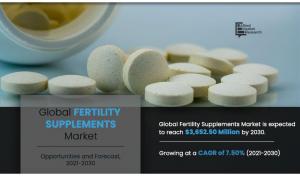Fertility Supplement Market by Ingredient, Product, End User, and Region: Global Opportunity Analysis and Industry Forecast, 2021–2030,"
PORTLAND, OREGON, UNITED STATES, February 13, 2024 /EINPresswire.com/ -- 𝐈𝐧𝐭𝐫𝐨𝐝𝐮𝐜𝐭𝐢𝐨𝐧:
Fertility supplements have garnered significant attention in recent years as individuals and couples increasingly seek solutions to support their reproductive health. These supplements, often formulated with a blend of vitamins, minerals, and herbal extracts, claim to enhance fertility and improve the chances of conception. Understanding the dynamics of the fertility supplements market is essential for both consumers and stakeholders in the healthcare industry. In this article, we delve into key insights derived from the latest research reports on the fertility supplements market.
As per the report published by Allied Market Research, the global fertility supplements market generated $1.75 billion in 2020, and is projected to reach $3.65 billion by 2030, registering a CAGR of 7.5% from 2021 to 2030.
𝐑𝐞𝐪𝐮𝐞𝐬𝐭 𝐒𝐚𝐦𝐩𝐥𝐞 𝐂𝐨𝐩𝐲 𝐨𝐟 𝐑𝐞𝐩𝐨𝐫𝐭 https://www.alliedmarketresearch.com/request-sample/A07134
Market Overview:
The global fertility supplements market has witnessed substantial growth over the past decade, driven by various factors such as changing lifestyles, delayed pregnancies, rising infertility rates, and growing awareness regarding reproductive health. According to recent market research, the fertility supplements market is projected to continue its upward trajectory, fueled by increasing consumer demand and advancements in product innovation.
Factors Driving Growth:
Several factors contribute to the expansion of the fertility supplements market. One significant driver is the rising prevalence of infertility worldwide. Factors such as stress, unhealthy diets, sedentary lifestyles, and environmental toxins have been linked to decreased fertility levels, prompting individuals to turn to supplements for support. Additionally, the trend of delaying parenthood due to career pursuits or personal choices has led to a greater need for fertility assistance among older individuals.
Moreover, heightened awareness about the importance of preconception health and the benefits of supplementation has bolstered market growth. Couples are increasingly proactive in optimizing their fertility before attempting to conceive, leading to a surge in the demand for fertility supplements. Furthermore, advancements in research and development have resulted in the formulation of supplements with targeted ingredients aimed at improving reproductive outcomes.
Market Segmentation:
The fertility supplements market can be segmented based on product type, distribution channel, and region. Product types commonly include prenatal vitamins, minerals (such as zinc and selenium), antioxidants, herbal supplements (such as chasteberry and maca root), and others. Distribution channels encompass pharmacies, specialty stores, online retailers, and supermarkets. Geographically, the market is segmented into North America, Europe, Asia Pacific, Latin America, and the Middle East and Africa.
Regional Analysis:
North America and Europe currently dominate the fertility supplements market, attributed to factors such as higher disposable incomes, advanced healthcare infrastructure, and increasing awareness about fertility-related issues. However, the Asia Pacific region is poised for rapid growth, driven by the large population base, rising disposable incomes, and changing cultural attitudes toward fertility and family planning.
𝐅𝐨𝐫 𝐏𝐮𝐫𝐜𝐡𝐚𝐬𝐞 𝐈𝐧𝐪𝐮𝐢𝐫𝐲- https://www.alliedmarketresearch.com/purchase-enquiry/7499
Challenges and Opportunities:
Despite its promising growth prospects, the fertility supplements market faces certain challenges, including regulatory constraints, lack of standardized guidelines for supplement usage, and skepticism regarding product efficacy. Regulatory agencies often have stringent requirements for marketing and labeling claims, posing hurdles for manufacturers. Additionally, the proliferation of misinformation and the presence of counterfeit products underscore the need for stricter quality control measures and consumer education initiatives.
Nevertheless, the market presents ample opportunities for innovation and expansion. Manufacturers are increasingly investing in research and development to develop scientifically validated formulations and differentiate their products in a crowded market landscape. Collaborations with healthcare professionals, fertility clinics, and reproductive specialists can enhance consumer trust and facilitate personalized recommendations. Moreover, leveraging digital platforms for marketing and e-commerce offers a convenient avenue for reaching a wider audience and driving sales.
𝐂𝐨𝐯𝐢𝐝-19 𝐬𝐜𝐞𝐧𝐚𝐫𝐢𝐨:
The Covid-19 pandemic positively affected the demand for fertility supplements as the Covid-19 virus affected fertility level of a person.
However, the prolonged lockdown and lack of skilled professionals during the pandemic negatively affected the market. The lockdown and restrictions on international trade disrupted the supply chain and create a huge gap between supply and demand.
Conclusion:
The fertility supplements market continues to evolve as a result of shifting demographics, changing lifestyles, and growing awareness about reproductive health. With a plethora of products available to consumers, understanding market trends, regulatory considerations, and consumer preferences is crucial for stakeholders across the industry. By staying abreast of market dynamics and embracing innovation, manufacturers and retailers can capitalize on the burgeoning demand for fertility supplements while addressing the unique needs of individuals seeking to optimize their reproductive health.
𝐎𝐭𝐡𝐞𝐫 𝐓𝐫𝐞𝐧𝐝𝐢𝐧𝐠 𝐑𝐞𝐩𝐨𝐫𝐭𝐬 𝐢𝐧 𝐋𝐢𝐟𝐞 𝐒𝐜𝐢𝐞𝐧𝐜𝐞 𝐃𝐨𝐦𝐚𝐢𝐧
𝐕𝐚𝐬𝐜𝐮𝐥𝐚𝐫 𝐄𝐦𝐛𝐨𝐥𝐢𝐳𝐚𝐭𝐢𝐨𝐧 𝐌𝐚𝐫𝐤𝐞𝐭 https://www.alliedmarketresearch.com/vascular-embolization-market-A13246
𝐆𝐚𝐬𝐭𝐫𝐢𝐜 𝐂𝐚𝐧𝐜𝐞𝐫 𝐌𝐚𝐫𝐤𝐞𝐭 https://www.alliedmarketresearch.com/gastric-cancer-market-A74458
David Correa
Allied Market Research
+1 800-792-5285
email us here
Visit us on social media:
Facebook
Twitter
LinkedIn


